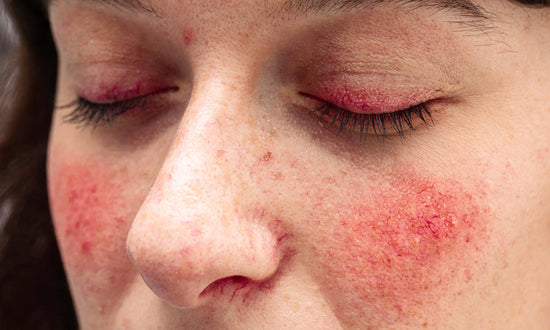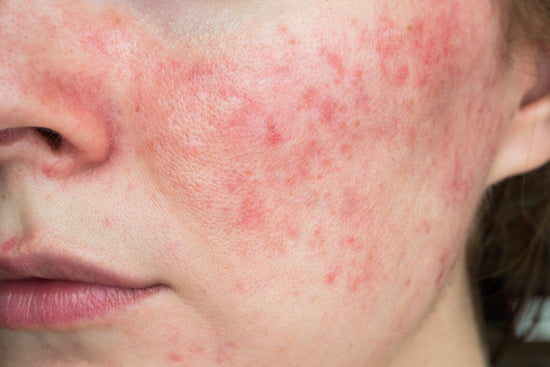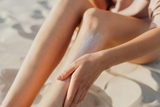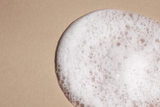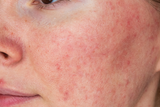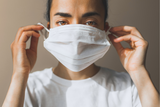Easy Peasy You
Natural cosmetics for rosacea: Why the right products are important
Posted by Lara Schimweg on
Conventional cosmetic products contain some ingredients that can trigger rosacea, such as mineral oil, silicone or synthetic fragrances. So if I have rosacea, should I rather Use natural cosmetics ?
What is rosacea?
Rosacea, or couperose, is a skin disease that is accompanied by redness of the face and often also by inflammatory papules and pustules . The first symptoms usually only appear in the mid or late 20s. Many people have not necessarily had skin problems before in their youth.
How is rosacea treated?
When treating rosacea, it is particularly important to avoid triggers in cosmetics, diet or the environment. Rosacea triggers can worsen the redness and other symptoms. The severity of the triggers is very individual. Some people with couperose can tolerate some of the known triggers.
Depending on the severity, there are also drug or surgical therapies.
There are a few things to consider when it comes to cosmetics for rosacea, as many ingredients in cosmetic products are triggers. With the right rosacea care with soothing and anti-inflammatory ingredients and also with appropriate make-up, redness can be reduced or covered. This can lead to more well-being and serenity.
Pros and Cons of Natural Cosmetics for Rosacea
The following advantages and disadvantages of natural cosmetics for rosacea are very general. In principle, all ingredients from natural cosmetics can also be found in conventional products. The reverse is not true. This means that all arguments against natural cosmetics can also apply to conventional products.
On the other hand, natural cosmetics can also be produced in a completely different way, so that the negative properties of natural cosmetics are eliminated. We have proven this with Xeno.
Pro Naturkosmetik
- Real natural cosmetics do not contain some of the trigger factors that can occur in conventional cosmetics. These include cortisone, perfume, PEG, parabens, mineral oil, urea or silicones.
- Some natural ingredients that are also used in natural cosmetics, such as green tea , oats, horse chestnut or licorice root , are very suitable for rosacea.
- Has nothing directly to do with rosacea: natural cosmetics are more sustainable than conventional cosmetics.
Contra natural cosmetics
However, many ingredients that are commonly found in natural cosmetics can also be trigger factors for rosacea and couperose:
- Natural fragrances such as essential oils (eg linalool) and flower hydrolates such as rose water or witch hazel are not only strong allergens but can also significantly intensify rosacea. Essential oils are also not a healthy idea for people without rosacea because they become a stressor when they come into contact with sunlight and generate free radicals. This means stress for rosacea as well as for any other skin. In the long term, essential oils can also trigger contact allergies.
- Alkaline cosmetics: Many natural cosmetic products do not match the pH value of the skin. This is between 5 and 6. Some natural cosmetic products, e.g. soaps, have a pH value of 8 or higher. This attacks the skin's protective acid mantle and makes it more susceptible to germs. Soaps also contain very harsh surfactants, which dry out the skin even more. It is often claimed that particularly greasy natural soaps do not have a drying effect on the skin. Unfortunately, this is not the case. The same applies to soaps that are supposedly specially made for sensitive skin: these should not be used if you have rosacea. Soap is not a mild way of cleansing your face .
- Drying alcohols : Natural cosmetics are usually preserved with alcohol. Many alcohols dry out the skin and can irritate it.
- Unprocessed (vegetable or animal) oils and fats: Rosacea skin can start to sweat under a layer of oil. This build-up of heat can lead to excessive blood circulation and the skin becoming very red. This causes what is known as a flush. Here you can find out more about the advantages and disadvantages of oils.
- Mechanical peelings contain much too large, sharp-edged peeling grains that can injure your skin. Micro-tears can appear in your skin that you cannot see with the naked eye. And these are ideal entry points for germs that can cause inflammation. This also includes clay/healing clay or products with salt or sugar grains.
- Fruit acids: Pineapple, papaya, hibiscus extract and other fruit acids act like strong chemical peels (which are not particularly suitable for couperose), but with the additional disadvantage that the natural acid content can vary greatly. These products can therefore be far too acidic for the skin in individual cases - especially in the case of rosacea.
My experiences with natural cosmetics for rosacea
I first became aware of my rosacea when I tried to completely switch my skin care and makeup to natural cosmetics . Suddenly my skin turned red and I got spots. Not typical hormonal spots, but small red pustules.
When I went back to using my conventional pharmacy products, which I had never changed for years, the nightmare suddenly stopped. My skin was fine again, but I personally didn't feel comfortable supporting brands that tested on animals and used unsustainable ingredients. It was a real dilemma for me.
So natural cosmetics are not suitable for rosacea?
Many have given up and are of the opinion that natural cosmetics do not work for rosacea. And if you look at the natural cosmetics market, you quickly notice that it is almost impossible to find products that do not contain the triggers mentioned. Some niche brands have already stopped using essential oils or have at least reduced their use - but the problem usually remains with the plant oils that are used carelessly for rosacea, flower hydrolates instead of water, fruit acids, the pH value, the stimulating extracts, etc.
But that's not because it's fundamentally impossible to produce natural cosmetics that are compatible with rosacea. Just because many natural substances are irritating to the skin doesn't mean they have to be used. A different way of thinking is needed to produce natural cosmetics for rosacea and sensitive skin. That's why our philosophy is that all Xeno products should be as compatible as possible for all skin types.
natural cosmetics without rosacea triggers
Facial care for rosacea with natural cosmetics
There are good alternatives to plant oils in natural cosmetics: Caprylic/Capric Triglyceride , squalane and lecithin are obtained from plants and processed in such a way that they correspond to or are very similar to the fat in the skin. This allows the skin to fully absorb these oils if it lacks fat. As an ingredient in natural cosmetic creams, these oils can protect your skin from moisture loss. However, couperose creams should be very light and contain a large amount of water with moisturizers such as hyaluronic acid or glycerin .
For mild preservation , there are moisturizing alcohols that are also well tolerated by rosacea: one of these is the fatty alcohol pentylene glycol . It naturally moisturizes your skin and has a preservative effect at the same time. Pentylene glycol is very mild and extremely well tolerated even by very sensitive skin and is therefore recommended for rosacea.
A mild cleanser for rosacea should only contain very mild surfactants . Mild sugar surfactants are among the most tolerable.
You can also wash yourself with a cleansing oil. These should not consist of pure oils but should always contain a skin-friendly emulsifier. Cleansing oil is particularly useful for heavier make-up. The plant oils they contain are not always easy to wash off the skin. This is why many people with rosacea do not tolerate cleansing oils very well.
Tip: Heavier makeup can also be removed with natural shea butter or jojoba oil, if you can tolerate them. You should then wash off the oil film with a mild sugar surfactant-based cleanser .
To soothe the skin, natural cosmetics for rosacea should contain antioxidants and soothing ingredients such as green tea , oats, licorice root or bisabolol. Fermented lactic acid bacteria strengthen the microbiome and reduce bad bacteria. This can reduce redness and make the skin less sensitive.
Vitamin C derivatives also strengthen the skin and make it more resilient to environmental stress. Please test individually how well you tolerate vitamin C derivatives. Pure vitamin C (ascorbic acid) is too potent for most people with sensitive rosacea skin and is therefore not recommended.
Sun protection is important for preventing skin cancer and is also the best “anti-aging agent” because it prevents pigment spots and wrinkles from forming as quickly. Sun protection is even more important for rosacea because the sun can be a trigger.
Finding a sunscreen that is well tolerated by rosacea is difficult in general, and even more difficult when the choice is limited. Sunscreen needs a film former so that the sun protection factors can be evenly distributed on the skin. Sunscreen must therefore contain vegetable oil, silicone, mineral oil, alcohol or other film formers, all of which are considered to be triggers for rosacea. Some sunscreen filters can also be rosacea triggers. That's why it's important that you find the sunscreen that works best for you individually. Because the best sunscreen is not the natural or conventional one, but the one you wear regularly.
Get our free sun protection guide for sensitive skin here
Here you will find tips and sunscreens from various brands that are also suitable for rosacea, so that you can find the right sunscreen for you.
By registering you confirm our Privacy Policy .
You will receive a confirmation email immediately. Confirm that we can send you messages and download the sun protection guide.
Natural Cosmetics Makeup for Rosacea
Natural cosmetics make-up usually contains a lot of plant oils and butters, which are too enveloping. In addition, there are only a few products without exotic extracts, fruit extracts, essential oils, etc.
The most compatible option for rosacea is mineral makeup in powder form, which only consists of natural, non-reactive mineral pigments. This does limit the options for the look and application somewhat, but it is always a solution if other makeup products are not working. Incidentally, mineral powder makeup contains zinc oxide, which can reduce papules and pustules because it counteracts inflammation.
When it comes to cream products, it's worth making sure that they contain as few plant oils as possible. If you can tolerate certain plant oils, you can of course look for make-up that contains these oils.
Tip: Instead of makeup, you can use a tinted sunscreen. The mineral filters in natural cosmetic sunscreen are usually well tolerated, you need one less product and the tint means you don't have a "whitening effect". The disadvantage could be the oils. See the section on skin care above.
Unfortunately, there is not much makeup in natural cosmetics that is suitable for rosacea. Don't put pressure on yourself: Especially with makeup, it's OK to make compromises if the market doesn't offer what you want.
natural cosmetics for rosacea
- Tags: Hautkrankheiten, Hautpflege, Make-Up, Naturkosmetik, Rosacea
← Older Post Newer Post →
0 comments

